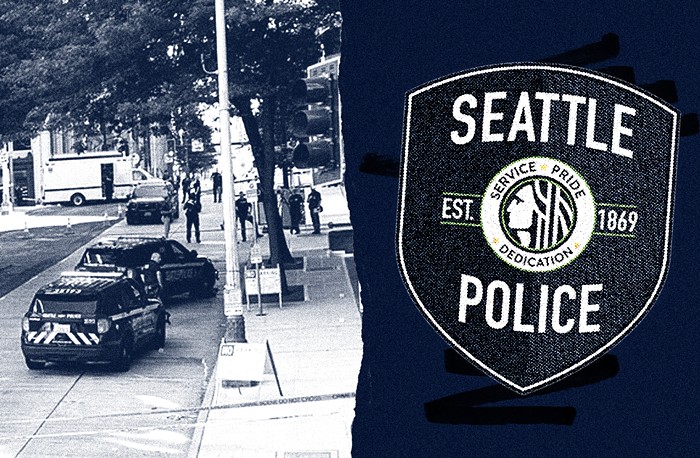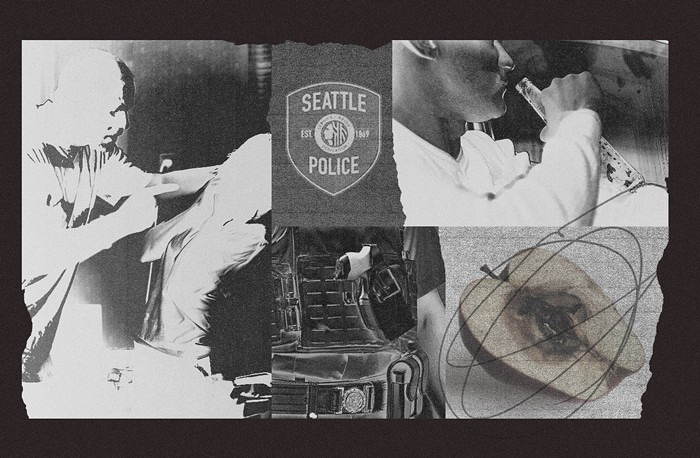
Seattle's only right-wing radio star, Jason Rantz, is biting this rock again: Cops are leaving the demoralized Seattle Police Department in droves. He points out that at end of next month, May, the SPD "will have lost nearly 100 police officers." (In 2019, the department had 1,400 officers, or 18 officers per 10,000 residents.)
Rantz registers this brawn drain, as I call it, as something truly catastrophic. It's as if the members of the SPD have something special about them, something that's hard to replace, a rare and precious resource like the anatomical knowledge in the head of a doctor or the mathematics in the head of a computer scientist. Once a cop leaves town, the officer takes with them forever the recondite science of handing out speeding tickets, of chasing and handcuffing shoplifters or small-time drug offenders, of keeping homeless people out of our city parks. What a loss.
Rantz writes:
"[Members of the SPD are] really disappointed in leadership for allowing what has happened to their communities,” [some doofus of a sheriff named] Knezovich said. “They’re really frustrated with the fact that they were not allowed to protect their communities.”
Spokane County Sheriff Ozzie Knezovich then explains "he’s taking advantage of the situation" and even has "billboards up in an effort to recruit cops from" the capitals of the Black Lives Matter movement, "Seattle, Portland, and Denver." But what kind of cops are going the way of Spokane anyway? Obviously those who feel they are not respected enough in Seattle. It's not like the city is underpaying them, or that their jobs are going to vanish anytime soon, or anything like that. These men and women of the badge are simply pissed about the perceived lack of admiration from the city they serve.
Clearly, a big part of being a cop is a feeling of importance that goes far beyond just getting the job done. A dentist does not have access to this higher social feeling. But police officers do. They see themselves serving a community with the same intensity as a soldier serving the country.
And this brings me to the point of this post. There are at present two approaches to progressive police reform in Seattle and in other cities. One is defunding, which really comes down to the reallocation of public funds tied up in police stations to other, less aggressive, forms of social management. The other is decriminalization, which is as (if not more) effective than defunding.
Decriminalization means cutting the link between cops and drug consumption, cops and sex workers, cops and traffic control, cops and even bike helmets or public drinking. A reduction in encounters between people—usually poor people—and police officers, means a reduction in the number of situations that go from zero to corpse in a few seconds flat.
But there is one more D we must add to the other two Ds. The first and most popular D has an economic dimension. The second has a legal dimension. This third category concerns the affective dimension. This D is deflation.
What is meant by this is the deflation of police patriotic pride or feeling. Meaning, the social status of police work must be reduced considerably. We need to see a police person in the same way we see a person bagging groceries in a supermarket. They are not heroes. They are just doing a job. And there many jobs to be done in a big city.
What deflation entails, in part, is banning US flags from cop cars and uniforms. The officer can only wear the flag or insignia of the city or county that pays them. The function of such a rule is it disconnects policing from soldiering. A member of the US Army/Navy/Air Force/Space Force is, of course, working for a government that's represented by the US flag. The same is true for a mail carrier. But it's certainly not true for a cop in the North Precinct, or South Precinct, or what have you. This deflation of self-feeling from a national register to a local one will help disenchant policing.
Deflation also means bringing to an end the description of police work as a duty. If a cop is killed while working, he or she is, exactly that, killed while working—not killed in the line of duty. This kind of national language (duty, sacrifice, service) only inflates a job that should instead strive to be as mundane as possible. We don't need another hero.
Here’s what the pins that Sheriff Clarke wears actually mean https://t.co/zzFgDOg6QS pic.twitter.com/r8bxawULyZ
— Dr. Jeffrey Guterman (@JeffreyGuterman) May 27, 2017



















